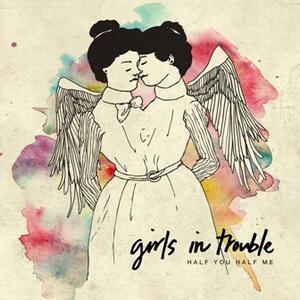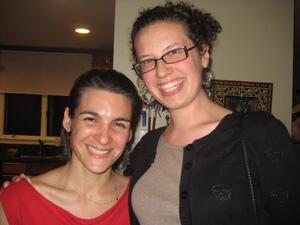Girls in Trouble: Telling women’s stories in a ‘language’ I understand
“The world is woven through us/I swear I wont forget/how her fingers hold the thread.” This is the final line of the song “Rubies,” off the amazing sophomore album "Half You Half Me" by the group Girls in Trouble, released on JDUB records earlier this month.
Girls in Trouble may sound familiar because we blogged about it in 2009. If you want to know more details about the project, the bio and music player on the Girls in Trouble MySpace page is a good place to start. In short, the band is the most recent incarnation of a “concept project” started a few years ago by front-woman Alicia Jo Rabins and expanded by bassist Aaron Hartman (now Alicia’s husband). I had the distinct pleasure of attending a Girls in Trouble house-concert this week. It was my first, but it definitely won't be my last.
As our generous host, Mark, stood in his small living room and introduced Girls in Trouble, I surveyed the 30 or so audience members and nodded my head, impressed at the wide range of people who had gathered to share in “learning and music.” True to that promise, each song highlighted the story of a woman from Jewish text or legend from well-known figures like Miriam to the more obscure Serah bat Asher. In between songs, Alicia shared why a particular narrative or moment spoke to her. I loved her description of Lilith’s story, captured in the song “We Are Androgynous” as the “original sense of platonic wholeness.”
At the end of the performance, the group opened the floor to questions. When asked why all of her songs are written in English, Alicia responded, saying that through Girls in Trouble she is “creating musical midrash in [her] own vernacular.” This is what impressed me most about Girls in Trouble. In an effort to make meaning out of her own experiences and observations, Alicia manages to capture the rich and courageous legacy of Jewish women and weave it seamlessly into the musical traditions of the American repertoire. With a background in classical violin, bluegrass, and punk, it’s clear that the music of this song cycle is as much an artistic work as it is a record of history, of what it means to be Jewish in the United States in 2011.
I was particularly touched by two pieces. “Waltz for a Beheading” which tells the story of Judith, conjures images of shadows wrestling across a backlit tent flap. The melody and the repetitive 1-2-3 of the waltz time stirred in me feelings of desperation and bravery that Judith must have felt when she realized there was only one way to save her people. “Rubies,” off the latest album, reinterprets the psalm Eshet Chayil to a tune that follows the traditional style of Appalachian music. My mother has always loved Eshet Chayil, and as the band members swayed back and forth in the dim light, I was wrapped up by the harmonies of voice, guitar, and fiddle and transported to Friday night, lighting candles at my mother’s house and smelling the deep, doughy smell of fresh baked challah.
Here at JWA, we’re in the business of collecting and sharing stories. More than that, JWA is a place where I come to discover the rich history that connects me to other women, Americans, and Jews. Sitting in that living room, I was both humbled and inspired by the grace and confidence that Girls in Trouble has harnessed in order to help people like me rediscover the stories of women and witness the record of history anew.







